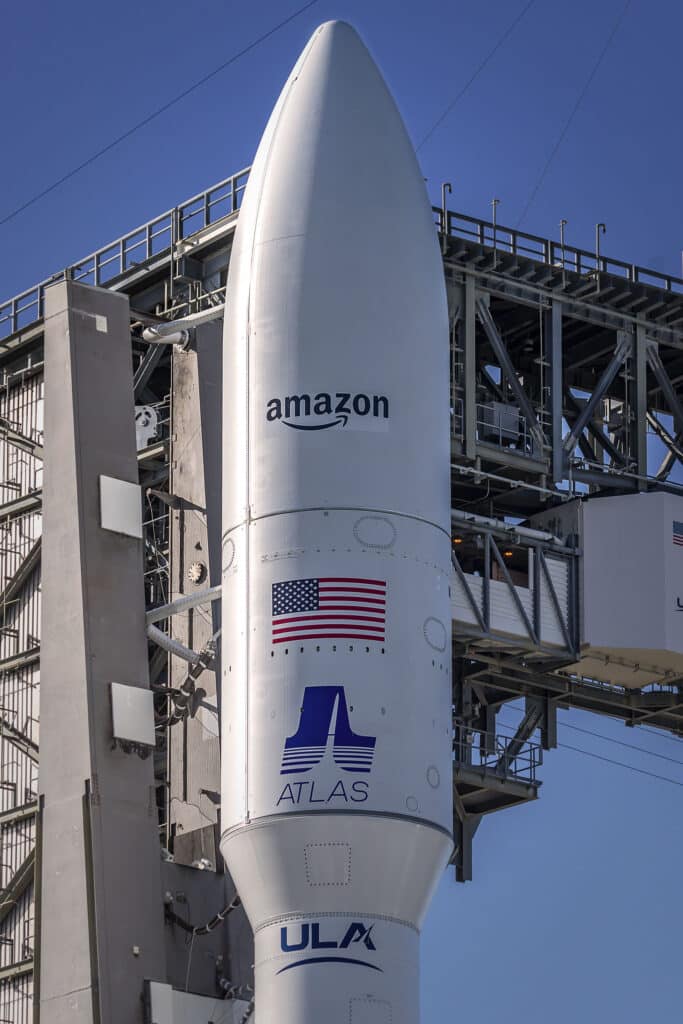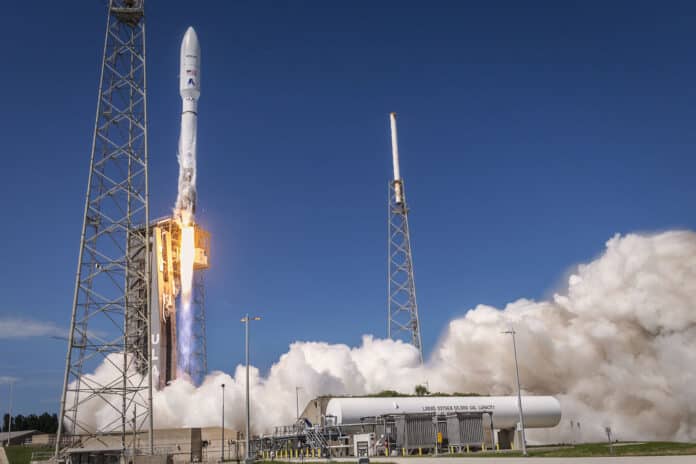On October 6, 2023, Amazon successfully launched two prototype satellites as part of Project Kuiper (pronounced Ky-per), Amazon’s new venture into becoming a global Internet Service Provider. The launch took place at Cape Canaveral Space Force Station in Florida, marking a significant milestone for the company. The satellites were launched on top of an Atlas V rocket provided by United Launch Alliance from ULA’s Pad 41.
The ambitious Kuiper project aims to create a mega-constellation of over 3,200 satellites that will provide internet service from orbit, competing with SpaceX’s Starlink service. With the Project Kuiper launch, Amazon is stepping into the space industry, joining its sister company, Blue Origin. Blue Origin is a separate venture by Amazon founder Jeff Bezos, which eventually will provide launch services for commercial and government customers.
The purpose of the prototype satellites used in this launch is to test the systems that will be used in Amazon’s planned satellite constellation. These satellites will pave the way for the deployment of thousands of satellites that will form a vast network in space, enabling global internet coverage. By launching these prototypes, Amazon aims to gather invaluable data and insights to improve the performance and reliability of its satellite internet service.
Competing with SpaceX’s Starlink Service
Amazon’s entry into the satellite internet market intensifies the competition among major players, including SpaceX, OneWeb, and Telesat. Amazon’s Project Kuiper will directly compete with the current leader in global internet innovation, SpaceX’s Starlink service. SpaceX has already launched thousands of satellites into orbit. Both companies aim to provide high-speed internet access to underserved areas of the world and bridge the digital divide. The success of Project Kuiper will depend on its ability to offer reliable and affordable internet connectivity, challenging the dominance of SpaceX in the satellite internet market.
According to Amazon, Project Kuiper holds immense potential to help connect unconnected populations around the globe to the Internet. With over half of the world’s population still lacking access to the internet, Amazon’s satellite network could bring connectivity to remote regions, rural areas, and developing countries. This connectivity has the power to transform education, healthcare, and economic opportunities for millions of people. The deployment of Project Kuiper’s satellites will be in five orbital planes to ensure coverage between 56 degrees north latitude and 56 degrees south latitude, which is an area that spans roughly from southern Alaska to the southern tip of South America.
Traditional internet infrastructure, such as fiber optic cables, is expensive and challenging to deploy in remote areas. Project Kuiper’s satellite-based approach eliminates the need for extensive terrestrial infrastructure, making it a cost-effective and scalable solution for global internet connectivity. By leveraging space-based technology, Amazon aims to bridge the digital divide and bring internet access to even the most remote corners of the world.
Amazon’s prototype satellites, KuiperSat-1 and KuiperSat-2, are equipped with state-of-the-art technology to deliver high-speed internet connectivity. These satellites incorporate advanced communication systems, solar panels for power generation, and flat, square antennas for beaming internet connections to ground-based receivers. The design of the satellites prioritizes efficiency, reliability, and scalability, laying the foundation for a robust satellite internet network. Project Kuiper’s success will depend on its ability to deliver low-cost and high-speed internet access, overcoming challenges of latency and signal interference.
With the successful launch of the prototype satellites, Amazon has entered a crucial phase of gathering valuable data and insights. The company will closely monitor the performance of the satellites, test their communication systems, and assess their ability to deliver reliable internet connectivity. This mission will provide Amazon with crucial data to refine its satellite technology and prepare for the coming full-scale deployment of the Project Kuiper mega constellation.
Amazon has set an ambitious timeline for the deployment of the Project Kuiper mega constellation. The Federal Communications Commission (FCC) has approved Amazon’s network, requiring the company to launch half of its satellites by July 2026 and the full constellation by July 2029. Meeting these deadlines will require seamless execution, efficient manufacturing processes, and collaboration with launch providers and a host of regulatory bodies. Amazon has not yet announced plans for pricing or a target date for general service availability.
Amazon’s Project Kuiper represents a significant leap forward in the pursuit of global internet connectivity. With its ambitious plans, Project Kuiper has the potential to bridge the digital divide, connect the unconnected, and empower previously isolated individuals and communities around the globe.


